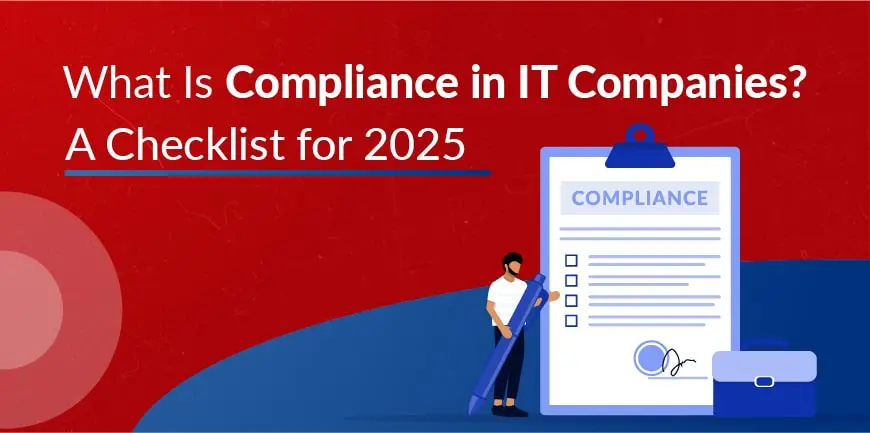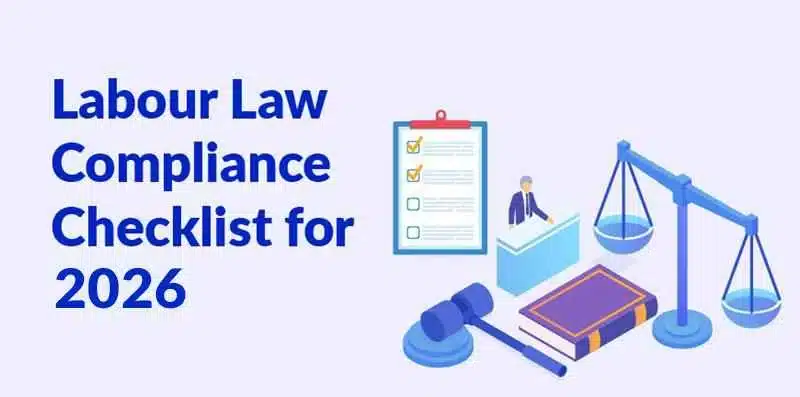
What is Workplace Diversity? Definition, Benefits, Challenges
08/11/2024
The Digital Agricultural Mission in India – How Technology Can Make It a Success
09/11/2024Complying with labor laws is essential to ensure that the IT company is not at risk of legal action from any quarter, including the Government, and that the people can focus on growth. Labor law compliance teams handle this very important task in each company around the world. Though labor law compliance in IT companies can be managed in-house, it can get quite complicated, and it helps to have a separate compliance partner working around the clock to help you.
What Is Labor Law Compliance for IT in India?
Labor law compliance in IT in India means complying with the labor laws instituted by the governing body, either the central or state, collectively for the tripartite, employees, employers, and unions. It will also involve documentation for the labor law compliance, tracking any issues associated with it. Apart from statutory labor law compliance, labor compliance may also include creating policies to safeguard employees’ rights at the workplace and maintain a congenial and safe work environment.
Labor Laws Relevant for IT Companies
There are several labor laws that are relevant to IT companies. Apart from below below-mentioned laws, the company itself would have internal policies that further define how employees must be treated and what conditions must exist in the workplace, while adding additional points on fairness.
- The Employees’ Compensation Act – 1923 – To compensate employees who were injured or died at the workplace.
- The Trade Unions Act 1926 – To define laws related to registered trade unions.
- The Employees’ State Insurance Corporation Act (ESIC) – 1948 – Employment insurance against injury or sickness.
- The Minimum Wages Act – 1948 – To prevent employee exploitation and to maintain a minimum standard of living for each employee.
- The Employees Provident Funds and Miscellaneous Provision Act (EPF) – 1952 – Special provisions for all employees.
- The Employment Exchange (Compulsory Notification of Vacancies) Act, 1959 – For the compulsory notification of vacancies to employment exchanges.
- Income Tax Act – 1961 – Specifies that tax deductions are to be applied to all individuals with an income.
- The Maternity Benefit Act – 1961 – To regulate the employment of women who are to conceive and to provide benefits.
- The Apprentices Act 1961 regulates the employment of apprentices in certain industries or trades.
- The Payment of Bonus Act – 1965 – For the payment of bonus due to an employee as a percentage of the salary.
- The Labour Welfare Fund Act (LWF) – Issued in different states or by different industries in different years to protect labor rights.
- The Payment of Gratuity Act – 1972 – Relates to the payment of gratuity after a period and the maximum amount fixed.
- The Equal Remuneration Act – 1976 – to provide for equal remuneration to men and women, and to prevent discrimination between them.
- Sexual Harassment of Women at Workplace (Prevention, Prohibition & Redressal) Act – 2013 – To prevent sexual harassment at the workplace for women.
- Shops and Commercial Establishments Act – Issued separately by each state, governing the licensing and operations of shops and other establishments.
Labor Law Compliance Checklist for IT Companies in 2025
There are several concepts under labor law that will be part of the labor law compliance checklist for IT companies. The most important among them are discussed below with the questions that you must add to your checklist for each point:
1. On-Time and Accurate Salary
IT companies generally pay their employees well, which is why most candidates still prefer a role in IT. What is the remuneration you are offering an employee in your IT company? What other benefits does it include? What are the total deductions from it? These questions will help you arrive at an ideal salary for the first important step in labor law compliance.
2. Work Schedule Redesign
A lot of IT companies work in different shifts, many in rotating shifts, to establish continuous communication with the client. What is the shift timing in the IT company? Is it a night shift or a staggered shift, and how convenient is it for an employee? You must also look at whether the working hours are considered favorable by the employee and if any lawful objections can be raised against them.
3. Occupational Safety Guarantee
Occupational safety is also very important in labor law compliance. How safe is the work environment? Even an IT office or building itself could host several worries, in terms of unhygienic workspaces or unclean toilets. Is there any way that employees can be trained on these hazards, so they stay safe? Also, look at how you can make the work environment safer for employees, including women who work on the night shifts.
4. Due Notice for Resignation
Every company has a notice period that an employee must complete. Based on the employees’ conduct and internal policies, this notice period could be shortened as well. The Government requires every IT company in India to give due notice to an employee before asking them to leave. Are there any other policies that need to be examined, and how can the exit interview process itself be bettered?
5. Unemployment Compensation May Need to Be Provided
Is there any unemployment compensation that you provide as a company? This comes under internal policy as the country or states in India do not demand any compensation for unemployed candidates post resignation. So, this is more a matter of internal company policy rather than any statutory labor law.
6. Harassment Protection Under Both External and Internal Policies
A company must have internal policies that restrict the chances of harassment, mental or physical, for any employee in the company, irrespective of sex. Are there proper laws in place in the company to help protect against harassment? How do these laws fit in with the laws instituted by the center and the state? What compensation is to be provided to the victims of such harassment?
7. Overtime Compensation Must Be Paid on Time
Great IT companies respect employees who work hard and long hours. It is necessary to note whether suitable compensation is provided to an employee, in line with salary and status, for any work done overtime. How is the quantum of work calculated? Is it pro rata as per the salary provided to the employee, or is there a fixed overtime fee awarded to all employees?
8. Maternity Benefits for Expectant Mothers
Maternity leave and additional benefits must be provided to expectant mothers as per the laws in India. Have you, as an employer in the IT industry, provided them the leave during the period they were eligible for it and a minimum salary that you are supposed to pay? Also, you could think if there is any way you could give add-on benefits to what you are already giving, and take serious steps to retain them for the future.
Are You Looking for a Labor Law Compliance Partner?
In an IT company, much like for any other commercial establishment, it is important to maintain labor law compliance. And of all the compliances that an IT company must maintain, labor law compliance is the most crucial. Alp Consulting, with over a decade of experience in IT compliance management, is the right partner to manage labor law compliance in IT companies like yours, be it management, monitoring, or even auditing. Talk to us today to know more.
Frequently Asked Questions (FAQs)
1. Do labor laws apply to IT employees?
Labor laws apply to all employees in India, regardless of the nature of work. But some laws may not apply to IT employees, such as those specifically for factories, which are more relevant for manufacturing. But yes, IT employees, like other employees, will be protected by laws governing the work, physical and mental conditions, work conditions, fair pay, etc.
2. Is the Minimum Wages Act applicable to IT companies?
The Act applies to all establishments, regardless of the nature of the business and industry type. This means that though it is okay to hire an intern or an apprentice at a much lower salary, it is not possible to hire permanent employees and offer them a salary lower than the minimum stated wages for a particular state in India.
3. Does the Factories Act apply to IT companies?
No, the Factories Act does not apply to IT companies, as there is no production involved in IT companies. Instead, IT companies fall under the purview of the Shops/Commercial Establishments Act. All rules that apply to shops and establishments apply to labor law compliance in IT companies, too.
Contact Us For Business Enquiry

Hariharan Iyer
Hariharan Iyer is the Vice President – Operations at ALP Consulting, bringing over 40+ years of experience in HR outsourcing and labour law compliance. He leads end-to-end HRO operations, ensuring process efficiency, statutory compliance, and seamless service delivery for clients across industries. With a strong background in labour law governance and workforce management, Hariharan plays a key role in driving operational excellence and compliance-led HR solutions at ALP Consulting.




